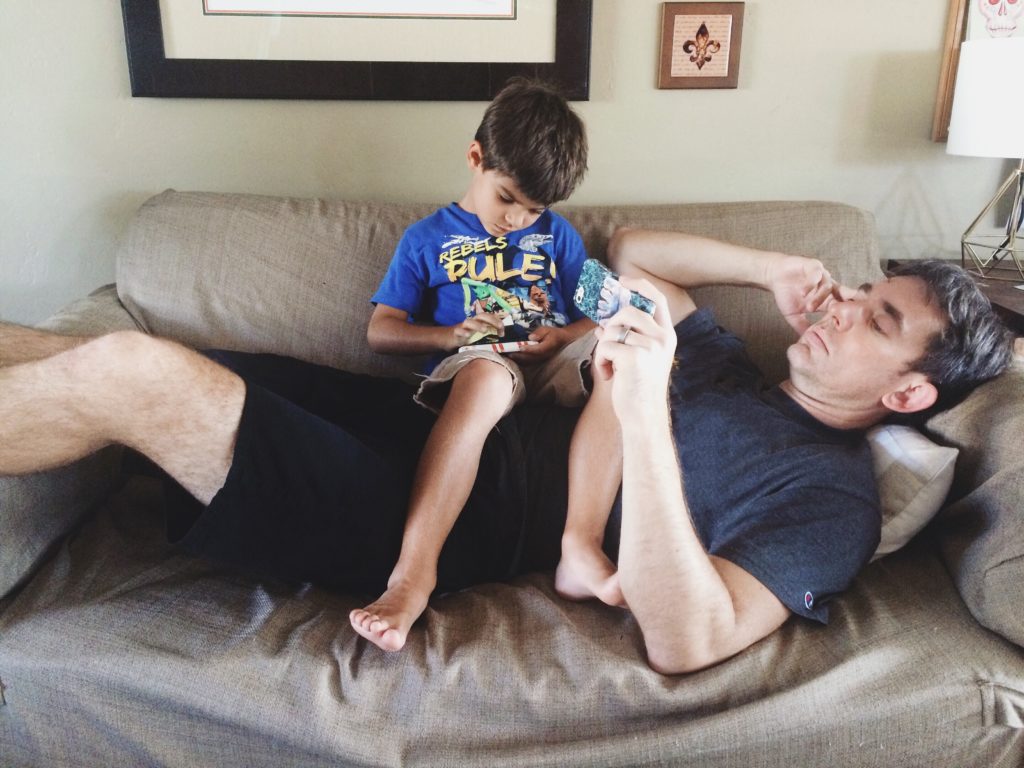 If you feel your smartphone, tablet, or watch is in danger of becoming an extension of your body, you aren’t alone. In fact, I’m going to fess up before we go any farther: After the release of the latest iOS update, with its Screen Time reports, my average daily screen time is [deep breath] somewhere between six and eight hours.
If you feel your smartphone, tablet, or watch is in danger of becoming an extension of your body, you aren’t alone. In fact, I’m going to fess up before we go any farther: After the release of the latest iOS update, with its Screen Time reports, my average daily screen time is [deep breath] somewhere between six and eight hours.
Granted, I earn a living as a writer, and some of my screen time is legitimately related to work. But a good deal of that time is *cough* multitasking in front of Netflix while vegging on the sofa after a long day. Or keeping up with hundreds of geographically dispersed friends on three social media platforms. Or responding to emails, whenever they come in, whether they originated in Mumbai or Monterey.
So, I get it. I understand the attractions and distractions of the bright, shiny screen, and I’m old. I’m also going to admit that a lot of those hours are also just plain fun. (Come on. We can talk. We’re adults here. Let he or she who does not have a game or six on a mobile device cast the first stone.)
But research is beginning to suggest that the effects of screen time on the developing brain are decidedly negative—and in some cases, downright alarming.
- According to the UK’s Daily Mail, “in December 2017 a team of Oxford University researchers found UK ‘zombie’ children’s average daily screen time has leapt in a generation from just under three hours to four hours and 45 minutes.”
- The same article explores the mental health effects of screen time (leisure time spent in front of televisions, videogames, tablets, smartphones) on children as young as two; researchers found preschoolers who spend four hours per day in front of screens are twice as likely to lose their temper and 46% less likely to be able to calm down than those who spent less time with screens.
- Older children suffer greater levels of anxiety and depression with rising rates of screen time, with adolescents leading the pack.
- Jean Twenge, a researcher on all things post-Millennial, has dubbed the next generation “IGen,” and she doesn’t mince words: She’s written a book about the upcoming generation of “digital natives,” and based on a large body of research, believes the devices they’ve been raised on “promote antisocial behavior, prolong childhood and increase loneliness, depression and political disengagement.”
- The U.S. National Institutes of Health began sounding the alarm about the health effects of screen time of all sorts on children several years ago, complete with a web page dedicated to helping parents set limits on screen time—but setting limits is always a dicey parenting affair, especially when children see Mom and Dad tethered to their own devices. (More on this challenge in a moment.)
- A new, critically acclaimed documentary, Screenagers, tackles the issue head-on with a balanced perspective and facts galore, including a wealth of resources for concerned parents and educators, including screen time contracts, links to pro-social videogames, copies of school cell phone policies, and more.
How to Talk to Children About Screen Time
My own mother is a now-grizzled veteran of countless late-night battles over my childhood leisure activity. Back in the day, we didn’t go head-to-head over screen time because the only screen was in the living room. Instead, shots were fired in the form of, “Turn out the lights, put the book down, and go to sleep.”
If I asked her today, she’d be the first to tell you she lost more of those battles than she won, because flashlights had funny ways of finding their way into my closet. Or under my bed. Or into my underwear drawer. (Kids, right?)
Unilateral parental attempts to restrict a child’s leisure activities always feel a bit dictatorial, especially if Mom and Dad are indulging in the very behaviors they are trying to limit. “Sure, Mom. I’ll put away my phone when you put yours down, too.” Ouch.
But it doesn’t have to be that way.
As parents who have gone through P.E.T. can attest, children are far more likely to collaborate and cooperate in rule-setting when they are actively involved in decisions to set limits.
In fact, P.E.T. offers a unique set of communication tools for negotiating age-appropriate limits on screen time, from problem ownership to I-Messages to Active Listening to Shifting Gears and more.
If battles over screen time are looming in the near future (or if they have already begun to cause meltdowns and screaming matches around the family dinner table), there is a healthy way to handle the conflict in a no-lose way. Best of all, the whole family benefits. Parents benefit because the approach eliminates unnecessary power struggles, diffuses tension, and restores peace. And children learn self-discipline, self-control and an inner sense of personal responsibility.

